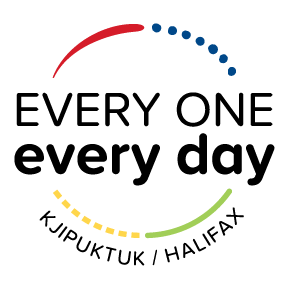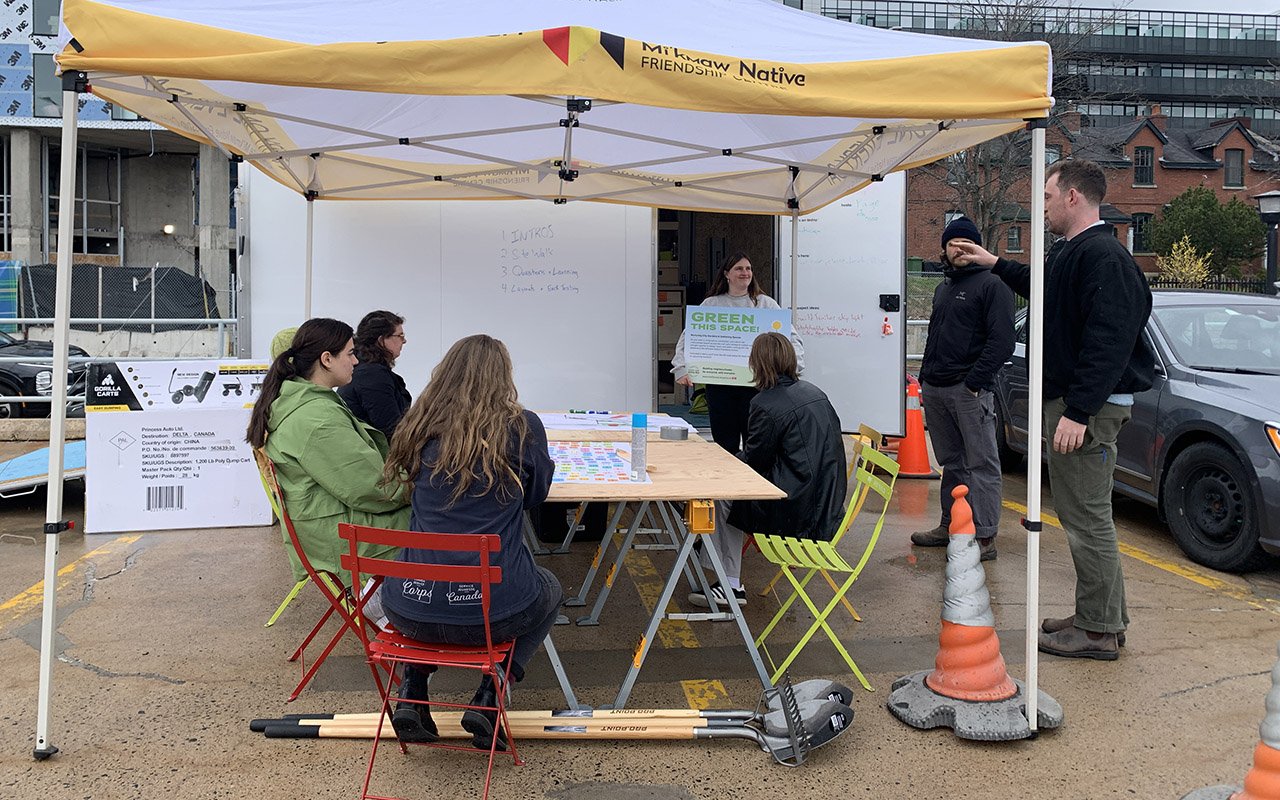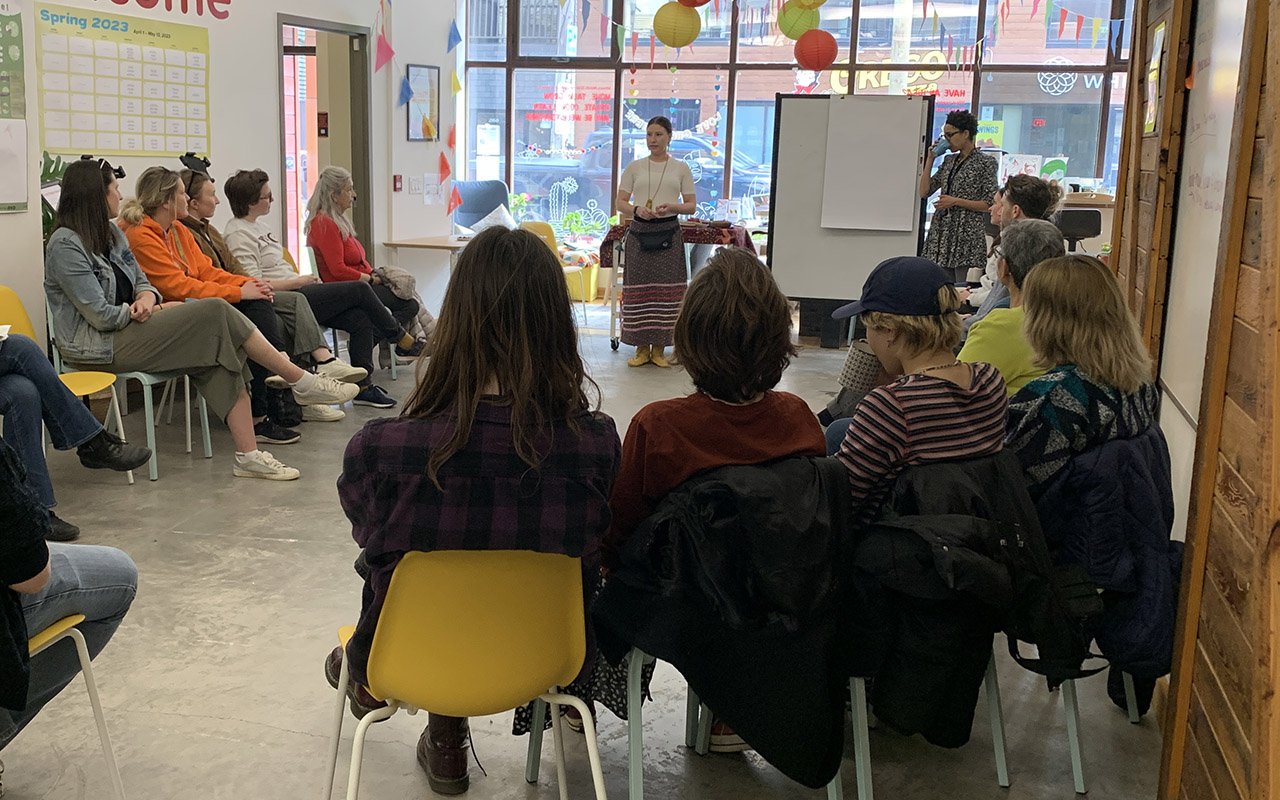Weaving Cohesion Through Inclusive Social Infrastructure
By Inda Intiar
Before the pandemic, my friends and I used to host community potlucks and conversation clubs. We’d invite folks from diverse cultural backgrounds and ask them to bring friends. We’d partner with a local café, or rent a space to host them. We relied on small grants from youth organizations, or our own pockets to fund them.
As immigrants, we empathize with the loneliness that folks new to the community told us they’d experienced. We were starving for spaces to connect where our intersecting identities were not something we had to tone down; where we were invited to share our heritage and interests in a fun activity.
Now I have the words to describe what we were looking for then: inclusive social infrastructure.
Residents participate in a session about Talking Sticks, hosted by Anishinaabe Elder Debbie Eisan, in the Every One Every Day Neighbourhood Shop.
Social infrastructures are public systems, amenities, buildings, spaces, platforms, services, activities, organizations, networks and movements that shape how people interact and support collective life. (Engle, Agyeman, & Chung-Tiam-Fook, Sacred Civics: Building Seven Generation Cities)
They help create patterns of how people live, work, create and take actions together, as well as how they relate to the world, says Jayne Engle, an urbanist with Dark Matter Labs and adjunct professor at McGill University.
These infrastructures are vital to community-building, well-being, and resilience. They help us build shared lives with our neighbours.
In times of crisis, social infrastructures can even save people, research by American sociologist Daniel Aldrich shows. A 2016 study of New York City neighbourhoods found residents' connectedness to each other was key for short-term recovery, as well as long-term restoration and resilience after Hurricane Sandy.
Unfortunately, social infrastructures are often overlooked in city design, because that connectedness between neighbours is often just assumed to exist.
Spaces like libraries, kiosks, schools, parks and community centres should also be connected–relationally and digitally, like a web, so they can offer complementary capabilities, Jayne says.
It’s important that these spaces are “radically inclusive” of everyone, she added. Though ones that specifically serve marginalized populations are needed, in order for transformation to happen, communities also need places for everyone - regardless of gender, age, ethnicity, class, race, abilities and other intersecting identities - to come together.
This is the inclusive social infrastructure that Every One Every Day Kjipuktuk/Halifax is developing and growing.
Kieran and Michael of OSO planning + design help neighbours plan a garden for the Mi’kmaw Native Friendship Centre.
Located in the city’s highly diverse, and quickly gentrifying North End neighbourhood, Every One Every Day is a community-based platform led by the Mi’kmaw Native Friendship Centre (Halifax, NS).
The participatory approach it uses creates the conditions that invite creativity and collaborations in daily life, helped by a platform that features a neighbourhood shop, Neighbourhood Project Designers, a seasonal newspaper, and a web of community organizations and businesses. The goal is to move towards local economies that are regenerative, focused on well-being and inclusive of everyone.
At the centre of it all is a commitment to Truth and Reconciliation, and Mi’kmaq culture.
Anishinaabe Elder Debbie Eisan, who has helped guide Every One Every Day’s approach, likens it to a dream catcher.
“When you weave a dreamcatcher, one part of the web depends on the other for its survival and support. And when you get to the centre of the dreamcatcher, you get to a circle in the centre that supports every other part of the web. The minute that you cut that centre circle, the web falls apart,” she explained.
“So it’s very important for us to web our communities together, to create this dream of every one every day in how we are moving forward.”
Mi’kmaw Native Friendship Centre Executive Director Pam Glode-Desrochers said at the launch of the neighbourhood shop in 2022 that the initiative has also required the people involved to work and engage with each other differently.
This is the type of personal transformation that inclusive social infrastructure rooted in Truth and Reconciliation can help foster.
“When we’re talking about social infrastructure, it’s the heart and soul of a community,” said Pam. “It’s a living, breathing entity that will grow and change, especially when the community is involved.”
Building Seven Generation Cities
Every One Every Day is one example of an initiative that provides an alternative to the siloed ways of operating we’re so accustomed to in North America. These separations breed a culture of competition, not collaboration.
Much of this is due to long-standing colonial values. In cities, settler colonialism is reflected in private land ownership, public spaces that are not designed with accessibility and Indigenous culture at the core, communities that are siloed, and economies that are not regenerative and inclusive, among other things.
To help reimagine civic life and the underpinning systems, Pam, Jayne, Tanya Chung-Tiam-Fook and others have come together to form 7GenCities. Tanya specializes in Indigenous perspectives and engagement on topics relevant to city-building and ecological and climate resilience.
7GenCities and its collaborators want to co-design communities and diverse infrastructures rooted in the Seventh Generation Principle.
Versions of this philosophy exist across many Indigenous cultures globally, including the Akawaio tradition of Guyana where Tanya’s roots are. 7GenCities is particularly inspired by the seven generation teachings of the Gayanashagowa (Great Law of Peace) of the Haudenosaunee Confederacy on Turtle Island, which emphasizes long term regenerative change and reciprocal relationships between peoples, and with the Earth.
“The Seventh Generation Principle requires us to work together to collectively decolonize and reimagine a lot of our dominant paradigms, systems, logics, and especially our governance, economic and political systems,” Tanya says.
Operations Manager Richelle hosts a session about land acknowledgements.
7GenCities will carry out field building work that invites reimagining cities of the future. Its initial work involves setting up a Learning Community with six cities across what is colonially known as Canada. Indigenous, municipal, and other civil society partners will be invited to share experience and learn together how to strengthen social infrastructure that embeds Truth and Reconciliation.
This decade, the Canadian government is planning to spend over $180 billion in infrastructure (2016 - 2028). Amid renewed calls for Reconciliation, heightened polarization and economic inequities, climate-related crises and the impacts of the pandemic on well-being and social cohesion, there’s a need to examine the values, assumptions and systems upholding the ways that cities and the infrastructures within are designed.
“Holistic and relational modes of change are so needed for addressing deep societal challenges, and they require a whole different way of being together. The beauty of it is, I think that’s mostly intuitive in us,” Jayne adds. “That gives me a great deal of hope.”
This is the first part of a series about Every One Every Day Kjipuktuk/Halifax as a practical example of inclusive social infrastructure that’s rooted in Truth & Reconciliation.
For further information about 7GenCities and the Learning Community being set up, please contact tanya@7GenCities.org and/or jayne@darkmatterlabs.org and/or pam@mymnfc.com. 7GenCities is a new collaborative, seeded initially with support from the Mi’kmaw Native Friendship Centre, Dark Matter Labs, and Community Foundations of Canada, and with funding support from WES Mariam Assefa Fund, Ontario Trillium Foundation, and the McConnell Foundation.
Inda Intiar (she|her) is a Transformation Storytelling Fellow with Community Foundations of Canada. Through this role, she seeks to use storytelling to showcase how innovation and initiatives on the ground can help transform broader systems and societies. She’ll focus on the work of 7GenCities and Every One Every Day Kjipuktuk/Halifax in providing social infrastructure that centers Truth and Reconciliation and encourages the inclusive and active participation of community members.



